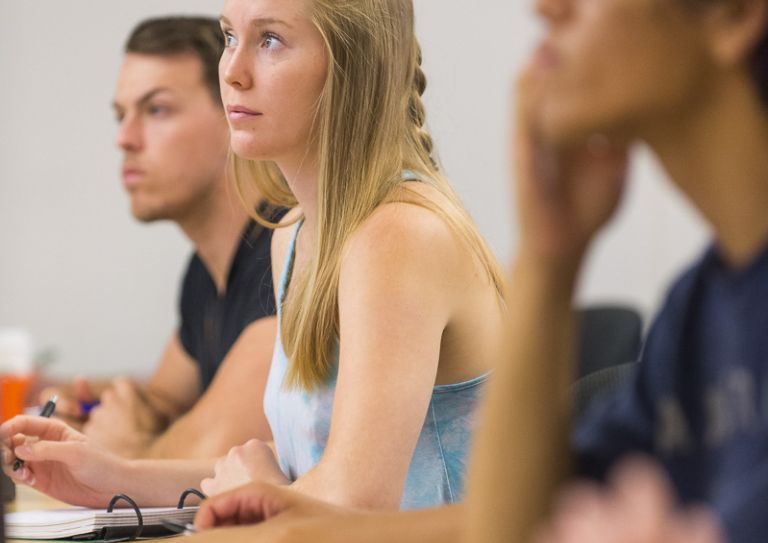GENERAL CRITERIA
- Courses will be designed as general education offerings open to all students within the university and not designed primarily for majors or specialists in a discipline. Ordinarily, there will be no course prerequisites other than satisfaction of skill requirements.
- Courses will represent the main ideas, approaches, and methodologies of a discipline or disciplines.
- Courses must develop at least two of the following skills: written communication, oral communication, critical thinking, quantitative literacy, research skills, cross-cultural awareness, ethical reasoning, civic responsibility, and aesthetic judgment.
- Students can take a maximum of eight units from a single department (as defined by subject code, e.g., HIST or ENGL or MPER) to satisfy the breadth requirement.
- Each course in the program must total a minimum of 3 semester units. The only exception to this rule is in area IIC where students can take three designated one unit courses in applied music or dance.
CATEGORY I: SOCIAL AND BEHAVIORAL SCIENCES
Area I-A Individual and Interpersonal Behavior
In addition to the general criteria, a course selected for Category I-A must meet at least one of the following specific criteria:
- The course helps students to understand and analyze individual human behavior
- The course helps students to understand and analyze interpersonal and collective interaction.
Area I-B U.S. Studies
In addition to the general criteria, a course selected for Category I-B must meet at least one of the following specific criteria:
- The course helps students to understand and analyze significant institutions, organizations, cultures and/or individuals in the United States.
- The course helps students to understand and analyze theories regarding the origins and development of the United States' history, economy, government, and cultures.
Area I-C Global Studies
In addition to the general criteria, a course selected for Category I-C must meet at least one of the following specific criteria:
- The course helps students to understand and analyze the history, institutions, values and actions of societies other than the United States.
- The course helps students to understand and analyze the ramifications of global or international interactions.
CATEGORY II: ARTS AND HUMANITIES
Area II-A Language and Literature
In addition to the general criteria, a course selected for Category II-A must meet at least one of the following specific criteria:
- The course helps students improve their written or oral expression.
- The course helps students understand the structure, function, and use of language, spoken or written, through the direct study of language or through the analysis of literary works.
Area II-B Worldviews and Ethics
In addition to the general criteria, a course selected for Category II-B must meet at least one of the following specific criteria:
- The course helps students investigate and develop an informed perspective on the meaning of human existence.
- The course helps students investigate and develop an informed perspective on the nature of right and wrong.
Area II-C Visual and Performing Arts
In addition to the general criteria, a course selected for Area II-C must meet at least one of the following specific criteria:
- The course helps students understand the visual or performing arts through analysis and practice.
- The course helps students understand various theories and historical trends in the visual or performing arts.
CATEGORY III: NATURAL SCIENCES AND MATHEMATICS
Area III-A Natural Sciences
In addition to the general criteria, a course selected for Area III-A must meet all of the following specific criteria. Also, courses in this area should not require an extensive background in college science as prerequisites.
- The course helps students learn the basic theoretical concepts and methodologies of a scientific discipline.
- The course requires students to apply scientific methods and theories through experimentation and observation.
- Laboratory or field experience must represent at least one-fourth of the students' instructional time and must be formally evaluated.
Area III-B Mathematics and Formal Logic
In addition to the general criteria, a course selected for Category III-B must meet at least one of the following specific criteria:
- The course enables students to understand and apply principles and procedures of mathematics, formal logic or both to solve problems.
- The course helps students gain some insight into the rational or logical basis for these principles and procedures, such as formal proofs, informal proofs, or demonstrations that lead to verifiable results.
Area III-C Science, Technology, and Society
In addition to the general criteria, a course selected for Category III-C (Science, Technology, and Society) generally need not require an extensive background in college mathematics or science prerequisites. Courses in this area must meet at least one of the following specific criteria:
- The course helps students learn the basic theoretical concepts and methodologies of a scientific discipline.
- The course helps students develop historical or philosophical perspectives on scientific theories, models and/or technology as applied to societal problems.
- The course helps students understand the effects of science and technology on society.



